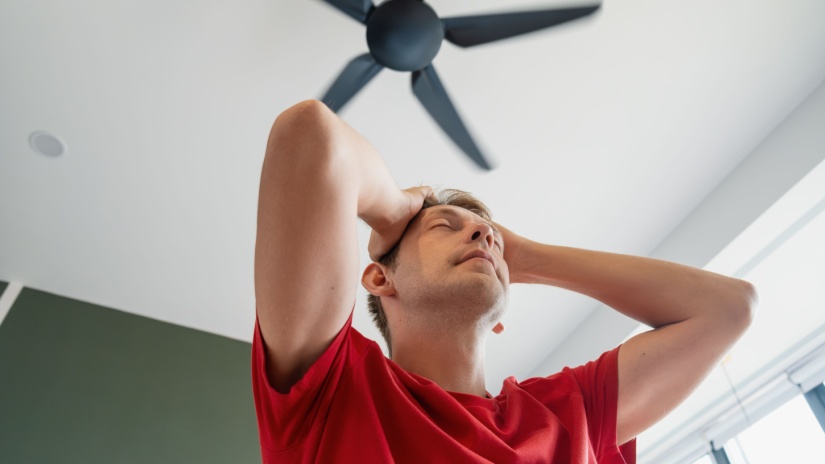Knowledge Centre
Fans vs air conditioning: Which is cheaper?

As temperatures rise during the warmer months, many of us are faced with the dilemma of how best to stay cool without running up an astronomical energy bill.
Two popular options for combating the heat are fans and air conditioning units, but when it comes to cost-efficiency, which one truly comes out on top?
In this article, we’ll compare the costs of running a fan versus an air conditioner, taking into account energy consumption, environmental factors, and long-term usage. By the end, you'll have a clearer understanding of which cooling method best fits your budget and needs.
Fans vs air conditioning: The comparison
There is every chance that your home has ceiling fans built in alongside air conditioning units throughout. You may have one or the other - or in the worst-case scenario, none at all. Understanding the best option for your home is going to depend on a range of factors. Luckily, we’ve fleshed them out for you below:
Cooling efficiency
Air conditioners are generally more efficient at cooling a space compared to fans, thanks to their advanced technology that uses coolant to lower air temperature.
While fans simply circulate air to create a cooling breeze, faster and larger fans can still provide noticeable cooling, especially when their airflow (measured in CFM or CMH) is high. Look for fans with a large blade span and high RPM for better performance and better cooling.
Air conditioning units, however, cool the air by removing heat and replacing it with cooler air, gradually lowering the room temperature. The effectiveness of an air conditioner depends on its cooling capacity, measured in kW, and its efficiency rating.
Air conditioners are often more energy-efficient due to their heat pump technology, which cools more heat per watt used, offering a higher cooling efficiency.
Upfront cost
When comparing the cost of fans and air conditioning, price is often the deciding factor, but there are other elements to consider as well.
While the price difference between a fan and a portable air conditioner may be minimal, air-conditioning systems generally have higher upfront costs, installation fees, and running costs.
How much does air conditioning cost?
Air conditioning prices for both supply and installation can vary widely, depending on the type and size of the system. On average, you can expect to pay:
- $300 for a portable air conditioner (no installation required)
- $600 for a small split system
- $6,000 for a whole-house ducted system
Ducted air conditioning is typically the most expensive, but it may be more cost-effective for larger homes than installing multiple split systems.
How much do fans cost?
The cost of a fan depends on its type, size, and features. Prices for basic fans generally start from:
- $20 for a desk fan
- $25 for a pedestal fan
- $30 for a box fan
- $50 for a tower fan
- $70 for a ceiling fan
Ceiling fans require installation by a licensed electrician or specialist, with installation costs ranging from $100 to $300 per fan, depending on the service, whether an existing fan is being replaced, and the number of fans being installed.
Health
Air conditioners can dry out the air and create conditions where bacteria and mould thrive. While air purifiers and humidifiers can help, air conditioners generally require more upkeep to maintain healthy indoor air quality.
In comparison, fans tend to have fewer health risks. Air conditioners, whether portable or built-in, can collect dust and mould in places that are harder to clean, and their filters are often not as efficient as HEPA filters. This can lead to the circulation of harmful particles, which may cause respiratory issues, and in extreme cases, affect heart health.
You should also consider that air conditioning can dry out the air, leading to discomfort such as dry skin, eyes, and breathing problems. If you use your air conditioner frequently, investing in a humidifier might help restore moisture to the air, making it easier to breathe.
How air conditioning works
Air conditioners cool a room by removing warm air and replacing it with cooler air from outside. The air is chilled as it passes over evaporator coils filled with refrigerant that absorbs the heat. Air conditioners come in various types and sizes, from portable units to ducted systems for entire homes.
| Advantage of air conditioning | Disadvantages of air conditioning |
| Lowers room temperature, offering actual cooling | Costs more to install and run compared with fans |
| Temperatures can be maintained or adjusted room to room | Consumes more electricity |
| Filters remove dust, pollen and allergens from the room | Reduces humidity, leading to dry skin |
| Modern units are quieter than fans | Requires regular cleaning and maintenance |
How do fans work?
Fans are simpler than air conditioners. As the blades spin, they push air over your skin, causing moisture to evaporate. This evaporation draws heat away from your body, helping you feel cooler.
Fans are available in various sizes, from small desk models to larger floor-standing and ceiling fans that circulate air throughout a room. Ceiling fans can also help lower the temperature by drawing warm air upwards and pushing cooler air down.
| Advantages of fans | Disadvantages of fans |
| Cheaper to buy, install and run | Only cools indirectly |
| Consumes minimal electricity, reducing carbon footprint | Cooling depends on room temperature and fan power |
| Portability - can be moved wherever you are | Fan blades and cords can pose a safety risk |
| Requires less maintenance and cheaper to repair | Can be louder than air conditioning depending on the model |
Do fans use more electricity than air conditioning?
When comparing the running costs of air conditioners and fans, it's important to consider electricity usage.
Ceiling fans generally use much less electricity than air conditioners. For example, a ceiling fan typically consumes around 65 watts per hour, which is about 20 times less than a split system air conditioner and up to 100 times less than ducted air conditioning.
In terms of running costs, you can expect to pay approximately:
- 2 cents per hour for a ceiling fan
- 25-95 cents per hour for a split system air conditioner
- $1.48–$1.94 per hour for ducted air conditioning
To get an idea of air conditioning costs, it's useful to compare it to other household appliances. Here’s a breakdown of average running costs:
- Refrigerator: 6 cents per hour
- Washing Machine: 23 cents per hour
- Dishwasher: 34 cents per hour
- Air conditioner: 50 cents per hour
Air conditioning can be one of the more expensive appliances to run, especially during the summer when energy bills can rise significantly. However, there are ways to reduce energy usage, which can lower your costs and free up money for other things.
Are fans better than air conditioning?
Choosing between a fan and an air conditioner depends on your needs and priorities. To help make the decision, consider these frequently asked questions:
What’s my budget?
Fans are cheaper to buy and run compared to air conditioners. For example, running an air conditioner for 8 hours a day during summer could cost about $4 per day, or $120 per month.
In contrast, a ceiling fan will only cost around 16 cents per day, or $4.80 per month for the same usage. Also, fans don’t require ongoing maintenance, whereas air conditioners need annual servicing to stay efficient.
Do I want to save energy?
Air conditioners use much more electricity than fans, leading to higher energy bills and a larger environmental impact (unless your home runs on renewable energy). A fan can run all day and consume the same energy as just 15 minutes of air conditioning. However, you might need several fans to cool the same space as one air conditioner.
How much cooling do I need?
Air conditioners are great for maintaining a consistently cool temperature in a room or throughout the house. While fans can’t achieve the same effect, they can circulate cool air from outside if you open windows during cooler times of the day.
Check the size and airflow rate of both options to ensure they’re powerful enough for your space. If you need both cooling and heating, consider a reverse cycle air conditioner or a ceiling fan with reverse rotation.
Do I need it to be portable?
Air conditioners and ceiling fans are typically fixed in place, but other types of fans, like pedestal or tower fans, can be moved around as needed.
This can help you avoid buying more fans than necessary. Portable air conditioners are also an option, but they need a suitable window for installation.
Should I combine fans and air conditioning?
Using both a fan and air conditioning together can offer the best of both worlds. A ceiling fan can help circulate cooler air and reduce the need for air conditioning alone, saving on energy costs while enhancing the cooling effect.
Cool down and save with Compare Energy
Are you ready to save on your energy bills this summer? Contact the team at Compare Energy on 1300 790 106 and we'll get you matched to the energy plans that save you money!

